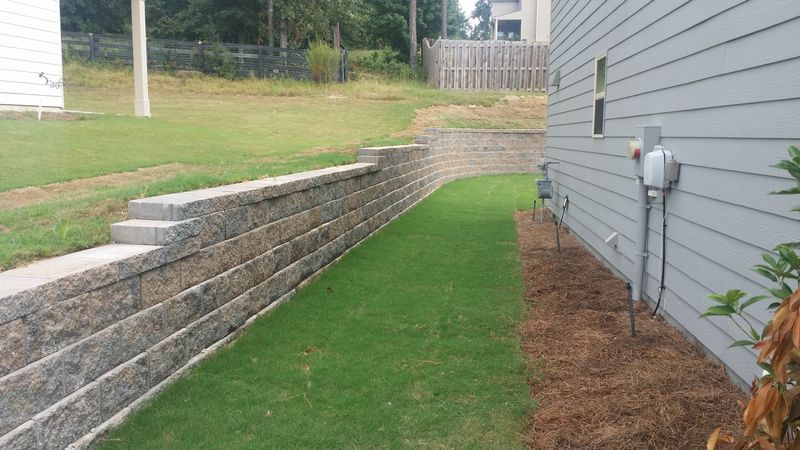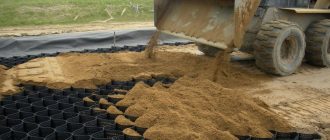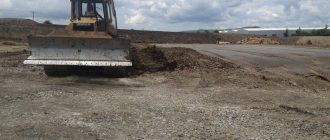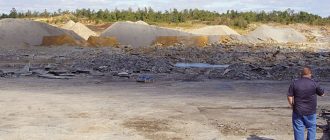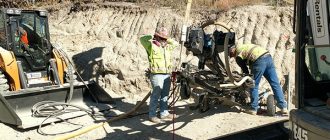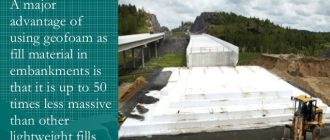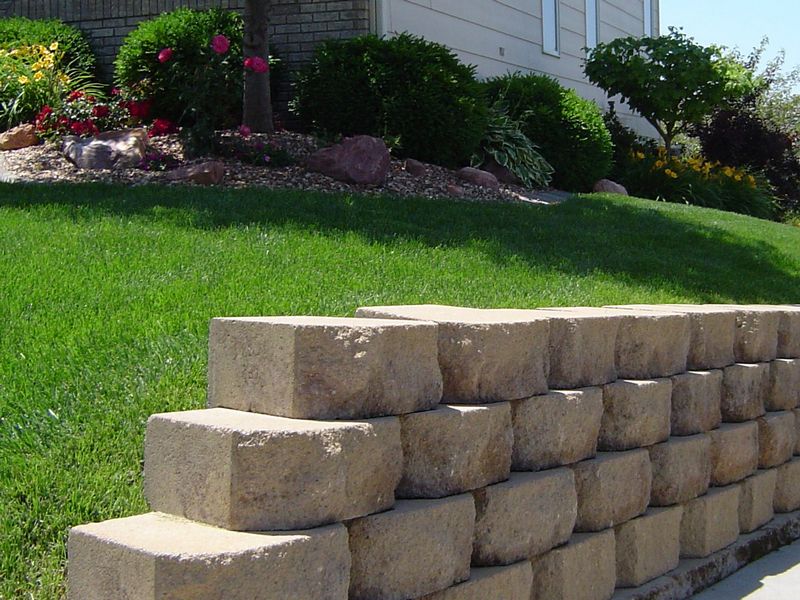
10 Use Cases for Retaining Walls on Commercial Properties
Retaining walls can provide numerous benefits for commercial properties. They are not only functional, but can also enhance the aesthetic appeal of your property. Here are 10 use cases where retaining walls can be beneficial:
1. Erosion Control: Retaining walls can prevent soil erosion and provide stability to sloped areas.
2. Expansion Space: Creating more usable space by leveling out uneven land with retaining walls.
3. Property Protection: Protecting your property from floodwaters or preventing damage from uneven ground.
4. Landscaping Enhancement: Adding depth and dimension to your landscape design with the use of retaining walls.
5. Terraced Gardens: Creating stunning terraced gardens that maximize space and add visual interest.
6. Parking Lot Retention: Building retaining walls to accommodate sloped parking lots and provide stability.
7. Noise and Privacy: Using retaining walls to create barriers that block out noise and provide privacy.
8. Outdoor Seating Areas: Designing attractive outdoor seating areas with the help of retaining walls.
9. Drainage Solutions: Preventing water from pooling and improving drainage with strategically placed retaining walls.
10. Foundation Support: Providing additional support to the foundation of your commercial building with retaining walls.
At XYZ Company, we specialize in designing and constructing tailor-made retaining walls for commercial properties. Contact us today to discuss your specific needs and how our retaining walls can benefit your business.
Use Cases for Retaining Walls on Commercial Properties – XYZ Company
Retaining walls are an essential component of commercial properties, providing numerous benefits and use cases for businesses. At XYZ Company, we specialize in designing and constructing high-quality retaining walls that meet the unique needs of commercial properties. Here are 10 use cases for retaining walls on commercial properties:
- Erosion Control: Retaining walls effectively prevent soil erosion on commercial properties, protecting valuable land and infrastructure from degradation.
- Slope Stabilization: Steep slopes can be a safety hazard for commercial properties. Retaining walls provide stability and prevent landslides or slope failures.
- Landscaping Enhancement: Retaining walls can be used to create beautiful terraced landscapes, adding visual appeal and increasing the usable space on commercial properties.
- Accessibility Improvement: By building retaining walls, commercial properties can overcome elevation changes and create accessible pathways for customers and employees.
- Water Management: Retaining walls help regulate water flow on commercial properties by directing it away from buildings and towards designated drainage systems.
- Outdoor Seating Areas: Retaining walls can be transformed into seating areas, providing comfortable and functional spaces for customers to relax and enjoy the surroundings.
- Boundary Definition: Retaining walls act as clear boundaries, separating commercial properties from neighboring ones while enhancing privacy and security.
- Noise Reduction: Retaining walls help mitigate noise pollution, creating a quieter and more comfortable environment for businesses and their customers.
- Structural Support: Retaining walls provide structural support to nearby buildings on commercial properties, ensuring their stability and longevity.
- Branding Opportunities: Retaining walls can be utilized as advertising spaces, promoting the brand and enhancing the visibility of commercial properties.
At XYZ Company, we understand the importance of retaining walls for commercial properties and offer expert solutions tailored to the specific needs of businesses. Contact us today to discuss how we can assist you in maximizing the potential of your property with our top-notch retaining walls.
Erosion Control
Erosion can be a major problem for commercial properties, especially in areas with sloping terrain or heavy rainfall. Retaining walls are an excellent solution for controlling erosion and stabilizing the soil on these properties.
- Preventing Slope Erosion: Retaining walls can be used to create terraces or levels on slopes, preventing soil erosion caused by water runoff.
- Bank Stabilization: When commercial properties are located near bodies of water, retaining walls can be used to stabilize the banks, preventing erosion caused by the water’s movement.
- Stormwater Management: Retaining walls can be designed to capture and divert stormwater, preventing erosion and minimizing the impact on surrounding areas.
- Protection of Infrastructure: Retaining walls can protect important infrastructure such as pipes, utility lines, and buildings from erosion, ensuring their longevity and functionality.
- Landscaping Solutions: Retaining walls can be used to create elevated beds for landscaping, preventing soil erosion and enhancing the overall aesthetics of the commercial property.
- Preventing Sinkholes: By preventing erosion and stabilizing the soil, retaining walls can help reduce the risk of sinkholes on commercial properties.
- Reducing Sediment Runoff: Retaining walls can effectively trap sediment, preventing it from washing away and polluting nearby bodies of water.
- Minimizing Land Movement: Retaining walls can limit the movement of soil and land, preventing erosion and preserving the integrity of the commercial property.
- Crop Protection: For commercial properties involved in agriculture, retaining walls can protect crops from erosion caused by heavy rain or other environmental factors.
- Enhancing Property Value: Implementing erosion control measures through retaining walls can increase the value of commercial properties, making them more attractive to potential buyers or tenants.
With their versatility and effectiveness, retaining walls are a valuable tool for erosion control on commercial properties. Whether it’s preventing slope erosion, protecting infrastructure, or enhancing the overall aesthetics, retaining walls offer numerous use cases in the commercial setting.
Slope Stabilization
One of the key use cases for retaining walls on commercial properties is slope stabilization. Slopes can present a significant challenge for property owners, particularly if they are steep or prone to erosion. Retaining walls provide an effective solution by holding back soil and preventing landslides or slope failures.
With their sturdy construction and expert design, retaining walls can support the weight of the soil and effectively redistribute the pressure. This helps to keep the slope stable and prevents erosion, making them an ideal choice for commercial properties located in hilly or mountainous areas.
The benefits of slope stabilization with retaining walls are numerous. Firstly, they increase the usable space on the property by creating level areas where buildings, parking lots, or recreational areas can be constructed. Secondly, they protect the property and its infrastructure from damage caused by soil movement or landslides.
Retaining walls also have aesthetic benefits, as they can enhance the overall appearance of the property. They can be designed to blend in seamlessly with the landscape or complement the architectural style of the buildings. In addition, they can be constructed using various materials such as concrete, stone, or timber, allowing property owners to choose an option that suits their preferences and budget.
Overall, slope stabilization is a crucial use case for retaining walls on commercial properties. By preventing soil erosion and landslides, retaining walls provide a safe and stable environment for businesses and their customers, while also enhancing the property’s aesthetics and usability.
Landscape Enhancement
Retaining walls can greatly enhance the landscape of commercial properties by providing a functional and aesthetic solution to various design challenges. Here are some use cases where retaining walls can be utilized:
- 1. Tiered Gardens: Retaining walls allow for the creation of tiered gardens, which can add depth and visual interest to the landscape. This can be particularly beneficial for commercial properties with limited space.
- 2. Slope Stabilization: If a commercial property has a sloped terrain, retaining walls can help stabilize the soil and prevent erosion. This is especially important in areas with heavy rainfall or strong winds.
- 3. Define Outdoor Spaces: Retaining walls can be used to separate and define outdoor spaces, such as patios, seating areas, or walkways. This can create a sense of structure and organization in the landscape.
- 4. Visual Focal Points: By incorporating retaining walls into the landscape design, commercial properties can create visual focal points that draw the eye and add interest to the overall aesthetics of the property.
- 5. Functional Seating: Retaining walls can be designed with built-in seating areas, providing functional seating options for visitors and employees. This can enhance the usability and comfort of outdoor spaces.
- 6. Noise Reduction: Retaining walls can help reduce noise pollution by acting as a barrier between the commercial property and external sources of noise, such as traffic or neighboring businesses.
- 7. Privacy Screens: If privacy is a concern, retaining walls can be constructed to create privacy screens or barriers, shielding certain areas of the property from prying eyes.
- 8. Water Features: Retaining walls can be integrated with water features, such as fountains or waterfalls, to create a soothing and visually appealing focal point in the landscape.
- 9. Increased Property Value: Well-designed retaining walls can increase the value of commercial properties by improving their overall aesthetics and functionality.
- 10. Easier Maintenance: Retaining walls can help to prevent soil erosion and the spread of weeds, making landscape maintenance tasks easier and more efficient.
By considering these use cases, commercial property owners can utilize retaining walls to enhance the landscape and create a visually appealing and functional outdoor space.
Property Protection
When it comes to commercial properties, protecting your investment is crucial. Retaining walls can be an essential asset in achieving this goal. Here are 10 use cases for retaining walls that demonstrate their value in property protection:
- Preventing soil erosion: Retaining walls provide stability and prevent soil erosion, ensuring the structural integrity of your commercial property.
- Protecting against flooding: By redirecting water flow, retaining walls can prevent flooding and water damage to your property.
- Creating a barrier: Retaining walls act as a physical barrier, deterring unauthorized access and protecting your property from intruders.
- Safeguarding against landslides: In areas prone to landslides, retaining walls can stabilize the terrain and protect your property from potential damage.
- Enhancing drainage: Properly designed retaining walls can improve drainage, preventing water buildup that can damage your property’s foundation.
- Supporting adjacent structures: Retaining walls provide structural support to adjacent buildings, ensuring their stability and preventing damage.
- Preventing property encroachment: Retaining walls can establish clear boundaries and prevent neighboring properties from encroaching on your land.
- Creating usable space: With properly designed retaining walls, you can maximize the usable space on your commercial property, allowing for additional construction or landscaping.
- Protecting landscaping: Retaining walls help prevent soil erosion and protect landscaping features, preserving the aesthetics of your property.
- Increasing property value: Utilizing retaining walls for property protection can increase the value of your commercial property, making it more attractive to potential buyers or tenants.
With these 10 use cases for retaining walls, it’s clear that they play a vital role in property protection for commercial properties. Invest in the right retaining wall solution to safeguard your investment and enjoy the peace of mind that comes with knowing your property is secure.
Increased Usable Space
One of the key advantages of using retaining walls on commercial properties is the ability to increase usable space. Retaining walls offer a way to level uneven terrain, creating flat areas that can be used for various purposes.
With the use of retaining walls, commercial properties can maximize their available space, making it more suitable for construction, landscaping, or other intended use. Whether it’s creating an additional parking lot, expanding outdoor seating areas, or building new structures, retaining walls play a crucial role in maximizing the usable space on commercial properties.
The use of retaining walls also allows for better utilization of sloped or hilly areas that would otherwise be difficult to develop. By constructing retaining walls, these areas can be transformed into functional spaces that can be easily accessed and utilized by customers, clients, or employees.
| Leveling uneven terrain |
| Creating flat areas for construction, landscaping, or other use |
| Maximizing available space for parking, seating, or new structures |
| Utilizing sloped or hilly areas that would otherwise be difficult to develop |
Flood Prevention
One of the most important use cases for retaining walls on commercial properties is flood prevention. Retailers, office buildings, and other commercial properties are often located in areas prone to flooding. Retaining walls can help mitigate the risk of flooding by redirecting water away from the property and towards designated drainage systems.
By using retaining walls, property owners can create barriers that prevent floodwaters from encroaching on their premises. These walls are designed to withstand the immense pressure of floodwaters and provide protection to the property and its occupants.
In addition to protecting the property, retaining walls also protect the surrounding area from the effects of flooding. By redirecting water towards drainage systems, they help prevent the flooding of nearby roads, buildings, and homes.
Flood prevention is a crucial consideration for commercial property owners, as it can save them from costly damages and disruptions to their business operations. By investing in retaining walls, they can ensure the safety and security of their property and minimize the impact of flooding on their business.
Noise and Visual Barrier
One of the most essential use cases for retaining walls on commercial properties is creating a noise and visual barrier. In busy urban areas or near highways, commercial properties often face challenges due to excessive noise and unsightly views. Retaining walls can effectively reduce noise pollution, creating a more peaceful environment for businesses and customers.
Additionally, retaining walls can act as a visual barrier, blocking the view of unsightly structures or adjacent properties. This not only enhances the aesthetic appeal of the commercial property but also provides privacy and a sense of security.
With various design options available, retaining walls can be customized to blend seamlessly with the surrounding environment, ensuring that the commercial property remains visually appealing.
Overall, the use of retaining walls on commercial properties serves as a practical solution to mitigate noise pollution and create a visually pleasing and tranquil space for businesses and their customers.
Custom Design Options
When it comes to retaining walls, XYZ Company offers a range of custom design options to suit the unique needs and aesthetic preferences of commercial properties. Our team of expert designers and engineers work closely with clients to develop functional and visually appealing solutions.
Whether you are looking to enhance the architectural features of your property or require a structural solution for sloping land, our custom retaining walls are the ideal choice. With our extensive experience in designing and constructing retaining walls, we are confident in delivering high-quality results that exceed our clients’ expectations.
Our custom design options for retaining walls include:
- Material Selection: Choose from a variety of materials such as brick, concrete, stone, or timber to match the overall design of your property.
- Color and Texture: Customize the color and texture of the retaining wall to complement the surrounding environment and architecture.
- Height and Shape: Determine the height and shape of the wall based on the specific requirements of your property.
- Integrated Features: Incorporate additional features into the retaining wall, such as built-in seating, lighting, or planters, to maximize functionality.
- Erosion Control: Implement effective erosion control measures, such as the installation of drainage systems or soil stabilization techniques, to ensure the longevity and stability of the retaining wall.
- Landscaping Integration: Integrate the retaining wall seamlessly into the surrounding landscape, incorporating elements such as steps, terraces, or garden beds.
At XYZ Company, we understand that every commercial property has unique requirements. Our custom design options for retaining walls allow you to create a solution that not only serves its purpose but also enhances the overall visual appeal of your property. Contact us today to discuss your specific needs and let our team bring your vision to life.
Cost Savings
Retaining walls have multiple use cases in commercial properties, and one of the significant benefits they offer is cost savings. By installing retaining walls, business owners and property managers can avoid expensive repairs and potential damage caused by erosion, soil movement, and water drainage issues.
Here are some cost-saving use cases for retaining walls on commercial properties:
- Preventing Soil Erosion: Retaining walls are an effective solution to prevent soil erosion, which can lead to costly damages to the property’s foundation and landscape.
- Stabilizing Sloping Terrain: By constructing retaining walls, commercial properties can stabilize sloping terrains, eliminating the need for costly grading and leveling work.
- Protecting Underground Utilities: Retaining walls can act as a protective barrier around underground utilities, minimizing the risk of damage and decreasing repair costs.
- Enhancing Drainage Systems: Properly designed retaining walls can improve the property’s drainage systems, reducing the chances of water accumulation and potential water damage to structures and foundations.
- Preventing Damage from Flooding: Retaining walls can be constructed to act as flood barriers, protecting commercial properties from costly flood damages.
- Preserving Landscaping: Retaining walls help retain and protect soil and landscaping features, reducing the need for frequent maintenance and replacement of plants and vegetation.
- Maximizing Land Use: By utilizing retaining walls, businesses can level uneven terrains and create more usable space without the need for costly excavation and land grading.
- Increasing Property Value: Well-designed and properly installed retaining walls can enhance the aesthetic appeal of commercial properties, attracting potential tenants and increasing property value.
- Reducing Liability Risks: Retaining walls can mitigate liability risks associated with property damage or injury caused by unstable slopes or erosion, potentially saving businesses from costly legal issues.
- Long-Term Durability: Investing in durable and reliable retaining walls ensures long-term cost savings by minimizing the need for frequent repairs and replacements.
Overall, incorporating retaining walls into commercial properties offers numerous cost-saving benefits by providing long-term stability, protecting infrastructure, and minimizing the risk of damage caused by erosion, soil movement, and water drainage issues.
Question-answer:
What are some use cases for retaining walls on commercial properties?
Retaining walls on commercial properties can be used for various purposes, such as creating extra usable space on sloped terrain, preventing erosion, providing privacy, and enhancing the aesthetic appeal of the property.
How can retaining walls on commercial properties create extra usable space?
Retaining walls can help level out a sloped area, allowing businesses to utilize the space more effectively. This can be used for parking lots, outdoor seating areas, or even for building expansion.
Do retaining walls on commercial properties help prevent erosion?
Yes, retaining walls are effective in preventing soil erosion on commercial properties. They hold back soil and prevent it from washing away during heavy rainfall or storms. This can protect the property and ensure its stability.
Can retaining walls on commercial properties enhance the aesthetic appeal of the property?
Absolutely! Retaining walls come in various designs and materials, allowing businesses to choose options that match their branding or desired aesthetics. Retaining walls can add visual interest and create a more inviting and professional atmosphere for customers and employees.

